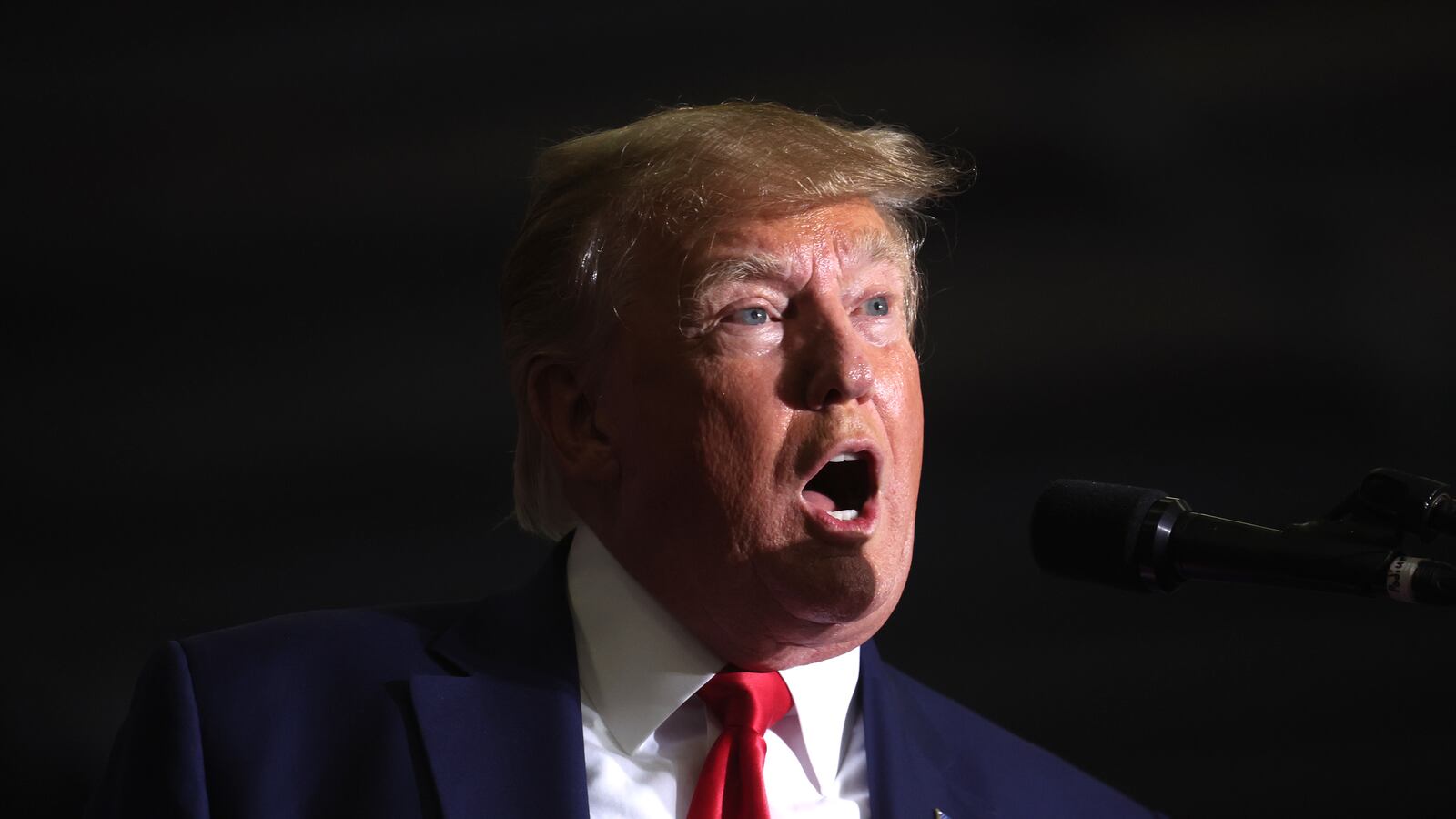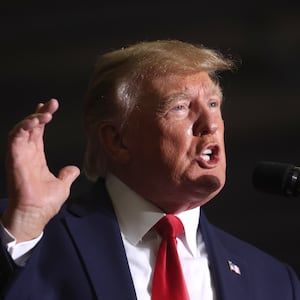Former President Donald Trump must pay a $10,000 fine every day until he turns over evidence to New York’s attorney general, after a state judge on Monday ran out of patience with Trump’s persistent refusal to abide by the law.
New York Judge Arthur F. Engoron has overseen the AG’s nearly two-year battle to squeeze evidence out of the Trump Organization in the state office’s ongoing investigation into alleged bank fraud at the company. The judge issued his order in court this morning and said contempt was appropriate because of “repeated delays and failures of Mr. Trump.”
“Mr. Trump, I know you take your business seriously. And I take mine seriously,” Engoron said.
AG Letitia James is reaching what could be the final stages of her Trump Organization investigation over the way the company has, for years, routinely inflated property values—something her investigators have deemed a scheme to dodge taxes and defraud banks.
In February, the judge ordered Trump and two of his adult children—executives Ivanka Trump and Don Jr.—to testify at a deposition. Although they continue to fight that on appeal, Trump himself was still obligated to turn over records.
Trump missed the March 3 deadline, got an extension to the end of that month, and still hasn’t turned over a page. Earlier this month, the AG’s office asked the judge to intervene.
“It’s been pulling teeth to get documents,” Kevin C. Wallace, an assistant attorney general, said in court.
Meanwhile, Trump’s attorney, Alina Habba, castigated this “a political crusade.”
“The attorney general’s fact finding endeavor has continued to expand and grow in unreasonable and burdensome ways,” she said in court. “This is truly a fishing expedition.”
The Trump Organization is turning over final batches of evidence that investigators say they must review before deciding whether to formally sue the company for violations of state business laws. While the law enforcement effort is merely civil in nature, this parallel investigation has largely fueled the criminal probe led by the Manhattan District Attorney’s Office.
The AG’s actions are now of paramount importance, given that the Manhattan DA’s investigation appears to be falling apart. A grand jury convened to consider indicting Trump on criminal charges is set to have its term expire at the end of this week, and prosecutors have not been allowed to seek an indictment because of reluctance from the new DA who inherited the investigation, Alvin Bragg Jr.
If the AG’s office does take action against the Trump Organization, it’ll do so under New York executive law § 63(12), which allows the law enforcement agency to essentially kill any business that engages in “repeated fraudulent or illegal acts.” If she prevails, the Trump family’s corporate empire might also have to pay monetary damages.
The fight over evidence has been long and nasty. From the time the AG’s probe started in March 2019, while Trump was still at the White House, state investigators met stiff resistance from the Trump Organization. The AG made its effort public in August 2020, when it initially asked the court to intervene. Trump’s other adult executive son, Eric, was forced to testify behind closed doors—but merely dodged questions by pleading the Fifth Amendment right against self-incrimination nearly 500 times.
Fast forward to January this year, when the AG’s office revealed in court documents the myriad of ways the Trump Organization had altered property values—including coming up with numbers that had no basis in reality—what James later called “significant evidence” of fraud. One glaring example highlighted by investigators was the way Trump allegedly valued Trump Tower on New York City’s Fifth Avenue on official financial statements by asserting that his three-floor palatial apartment there was 30,000 square feet, even though in reality it was a third of that.
In the aftermath, the company’s long-time accountants at Mazars USA suddenly ditched them and disavowed past work it had done for Trump.
In court on Monday, Trump’s personal attorney tried to make the case that Trump shouldn’t be held in contempt of court for not turning over evidence because the AG’s office gave him a loophole: only turn over documents your company hasn’t already turned over.
Habba asserted that the company was already delivering records. However, the Trump Organization has not finished turning over paperwork, so investigators are still missing some evidence.
The judge’s principal law clerk, Allison R. Greenfield, zeroed in on what she identified as a contradiction.
“How can you affirm they’ve all been produced but on the other end say they’ll be produced later?” Greenfield asked.
Habba then chalked up the situation to “miscommunication” with the AG’s office, saying “this amounts to a very large misunderstanding.” The lawyer explained how she recently flew south to Trump’s personal estate at Mar-a-Lago in South Florida, where the twice-impeached former president assured her personally that he didn’t have any records about his property valuations (among other reasons, because he allegedly doesn’t text or email).
That surprised the judge and the attorney general’s lawyers, because Habba hadn’t asserted any of that in legal paperwork before the hearing.
“The problem is nothing is on the record,” Greenfield told Habba. “We wouldn't have to be here today if you'd just provided an affidavit.”
“There is a difference between saying something and saying something under oath,” the judge noted.
“Donald Trump does not believe he's above the law,” Habba said. “He doesn’t have anything more to give. My client is an honest person, much to the dismay of people in this room.”
But the attorney general’s lawyers stressed that even sworn documents wouldn’t be enough, because investigators want to see the files themselves.
“We know Mr. Trump has two cell phones… the only way is to have the phones imaged and searched,” said assistant attorney general Andrew S. Amer. “We certainly know he tweets.”
“We don’t have cooperation. It impacts every other aspect of the investigation. We are being hampered in our efforts to have a complete investigation, because we don't have evidence from the person who sits at the top of this organization,” Amer said.









